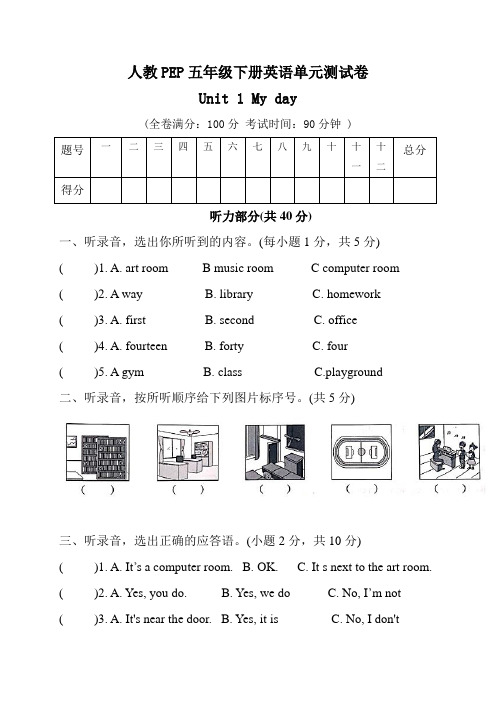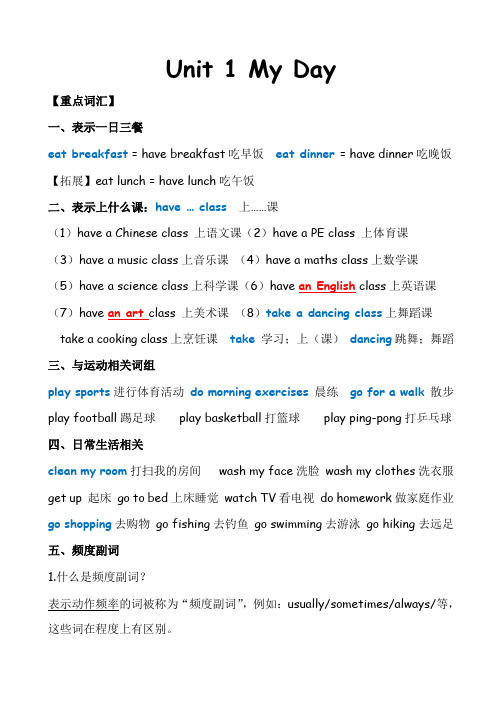新pep五年级下册英语unit1Myday复习
五年级下册英语第一单元unit 1 my day(人教pep版,含答案和听力原文)

人教PEP五年级下册英语单元测试卷Unit 1 My day(全卷满分:100分考试时间:90分钟 )题号一二三四五六七八九十十一十二总分得分听力部分(共40分)一、听录音,选出你所听到的内容。
(每小题1分,共5分)( )1. A. art room B music room C computer room ( )2. A way B. library C. homework( )3. A. first B. second C. office( )4. A. fourteen B. forty C. four( )5. A gym B. class C.playground二、听录音,按所听顺序给下列图片标序号。
(共5分)三、听录音,选出正确的应答语。
(小题2分,共10分)( )1. A. It’s a computer room. B. OK. C. It s next to the art room. ( )2. A. Yes, you do. B. Yes, we do C. No, I’m not ( )3. A. It's near the door. B. Yes, it is C. No, I don't( )4. A. They’re so big. B. They re very nice. C. Thank you ( )5. A. Forty. B. Forty yuan C. Forty computer rooms四、听录音,判断下列句子与所听内容是(T)否(F)相符。
(每小题2分,共10分)( )1. The teachers' office is next to the music room .( )2. Miss White is on the second floor.( )3. There are two computer rooms in their school .( )4. There are thirty-six students in their class.( )5. The music room is on the second floor.五、听录音,根据短文内容,判断下列句子正(T)误(F)。
PEP五年级英语下册Unit1-6重点知识小结

Unit 1 This Is My Daydo morning exercises晨练eat breakfast吃早饭have english class上英语课play sports进行体育运动eat dinner吃晚饭when什么时候evening夜晚;晚上get up起床at在……点钟usually通常;一般noon中午climb mountains爬山go shopping购物;买东西play the piano弹钢琴visit grandparents看望祖父母go hiking去远足weekend周末often经常sometimes有时候话题1:日常生活时态:一般现在时1.When do you do morning exercises? 你什么时候做早操?I usually do morning exercises at 8:00. 我经常八点钟做早操。
(I usually get up at 12:00 at noon . 我经常在中午十二点起床。
) 2.When do you eat dinner ? 你什么时候吃晚餐?I eat dinner at 7:00 in the evening. 我在晚上七点种吃晚餐。
3.When is the best time to go to Beijing? Fall. 最好在什么时候去北京?秋天。
Unit 2 My Favourite Seasonspring春天summer夏天fall秋天winter冬天season季节which哪一个best最;极swim游泳fly kites放风筝skate滑冰make a snowman堆雪人plant trees种树why为什么because因为sleep 睡觉话题2:季节时态:一般现在时1.Which season do you like best ? I like spring best.(Spring.)你最喜欢是什么季节?我最喜欢春季。
人教PEP版五年级英语下册 Unit 1 My day 知识点清单

Unit 1 My day一、核心词汇1.动词: take 学习;上(课)2.名词: dancing跳舞;舞蹈exercise活动;运动3.短语: do morning exercises做早操eat breakfast吃早饭play sports进行体育运动eat dinner吃晚饭go for a walk散步go shopping去买东西;购物clean my room 打扫我的房间take a dancing class 上舞蹈课have … class 上……课二、了解词汇1.动词: start开始shop去买东西;购物work工作need需要live居住win获胜sound听起来好像2.名词: Spain西班牙play戏剧;剧本letter信island岛cave山洞;洞穴3.介词: after在(时间)后4.其他: when什么时候;何时late晚;迟 a.m.午前;上午p.m.午后;下午why为什么last上一个的;刚过去的also还;也busy 忙的5.拓展词汇——频率副词(1)定义: always, usually, sometimes等词叫作频率副词,用来表示动作发生的频率,但程度上有区别。
按频率大小可做如下排列: always > usually > sometimes(2)位置:频率副词一般放在主语之后、实义动词之前。
I always get up at 6:30. 我总是六点半起床。
I usually watch TV on the weekend. 我周末通常看电视。
(usually也可用于句首)I sometimes visit my grandparents. 有时我看望我的祖父母。
(sometimes也可以放在句首)6.短语:watch TV看电视eat lunch吃午饭go to bed上床睡觉go swimming去游泳 go home回家go to school去上学三、核心句型1.— When do you do morning exercises? 你什么时候做早操?— At 7 o’clock. 七点。
Unit 1 My day (复习课件) 五年级英语下册(人教PEP版)

9. 你需要一个机器人帮助你! _Y_o_u__n_ee_d__a__ro_b_o_t_t_o__h_el_p_y_o_u_! ____________________
A. always B. sometimes C. usually
C( )3. -________is your birthday party?
-It was great fun.
A. When
B. What
C. How
单项选择
C( )4. I often go _______ with my mother.
-我经常看电视, 和我爸爸打乒乓球。 _-_I_o_f_t_e_n_w_a_t_c_h_T__V_a_n_d__p_la_y_p_i_n_g-_p_o_n_g_w__it_h_m__y_f_a_t_h_er. 5.那听起来很有趣。_T_h_a_t _s_o_u_nd_s__li_k_e _a__lo_t_o_f__f_un_._____
具体日期和星期前面用介词on。
【eg】: 1.I do morning exercises at 7 o’clock. 2.I usually do my homework on Sundays.
牛刀小试
( B )1.-_______ do you have English class?
-At 9 o’clock.
A.Tuesday B.busy
( C )4.please
A.eggplant B.play
C.please C.clever
C.pupil C.party
人教版PEP英语五年级下册Unit1-My-Day知识点归纳与练习(含答案)

Unit 1 My Day【重点词汇】一、表示一日三餐eat breakfast = have breakfast吃早饭eat dinner= have dinner吃晚饭【拓展】eat lunch = have lunch吃午饭二、表示上什么课:have … class 上……课(1)have a Chinese class 上语文课(2)have a PE class 上体育课(3)have a music class上音乐课(4)have a maths class上数学课(5)have a science class上科学课(6)have an English class上英语课(7)have an art class 上美术课(8)take a dancing class上舞蹈课take a cooking class上烹饪课take学习;上(课)dancing跳舞;舞蹈三、与运动相关词组play sports进行体育活动do morning exercises晨练go for a walk散步play football踢足球play basketball打篮球play ping-pong打乒乓球四、日常生活相关clean my room打扫我的房间wash my face洗脸wash my clothes洗衣服get up 起床go to bed上床睡觉watch TV看电视do homework做家庭作业go shopping去购物go fishing去钓鱼go swimming去游泳go hiking去远足五、频度副词1.什么是频度副词?表示动作频率的词被称为“频度副词”,例如:usually/sometimes/always/等,这些词在程度上有区别。
2.常见频度副词按频率大小排列如下:always(100%)>usually(80%)>often(60%)>sometimes(20%~40%)> never (0%)3.注意频度副词的使用位置:①We usually go to school at seven in the morning.②What do you often do on the weekend?六、常见时间的表达方式1.at + 具体的几点钟;at noon在中午;at night在晚上2.in +月份/季节/早中晚例如:in the morning/afternoon/evening3.关于on表示时间的几种情况:①on + 星期几;②on + 几月几日;③on the weekend在周末;④on Monday morning星期一早上。
PEP小学五年级英语下册知识清单

PEP小学五年级英语下册Unit 1 My day 知识清单【句型/语法知识点】一. 频度副词(放主语之后)。
always总是(100%); usually通常(80%); often 经常(60%);sometimes有时(30%);never从不(0%)二. 重点句型。
1. 询问别人什么时候做某事的句型及回答。
句型结构:问:When +助动词do/does + 主语(非三单/三单)+ 动原+ 其他?答:①主语(非三单)+(频度副词)+动原+ at + 时间点.例:问:When do you go to bed?答:I go to bed at 9:00p.m答:②主语(三单)+(频度副词)+动词三单形式(动词s/es)+ at + 时间点.例:问:When does Amy go to bed?答:She goes to bed at 9:00 p.m.2. 询问别人周末做什么的句型及回答。
句型结构:问:What +助动词do/does + 主语(非三单/三单)+ do + on the weekend?答:①主语(非三单)+(频度副词)+动原.例:问:What do you do on the weekend?答:I usually read books.答:②主语(三单)+(频度副词)+动词三单形式(即动词s/es).例:问:What does Amy do on the weekend?答:She often goes shopping with her mother .三.句型转换:1.肯定句↔一般疑问句:I usually get up at 6:00. ↔ Do you usually get up at 6:00?肯定回答:Yes, I do. 否定回答:No, I don’t.(第三人称时) He eats dinner at 6:00p.m. ↔ Does he eat dinner at 6:00p.m.?肯定回答:Yes, he does. 否定回答:No, he doesn’t.2.肯定句↔否定句:I like playing the piano. ↔ I don’t like playin g the piano.I can play the piano. ↔ I can’t play the piano.3.划线提问:⑴ I often go shopping on the weekend. → When do you go shopping ?⑵ I often go shopping on the weekend. → What do you do on the weekend?⑶ I go to school at 7:00. → When do you go to school?四. 语音:cl /kl/ clean clock class clever pl /pl / plate eggplant please playPEP小学五年级英语下册Unit 2 My favourite season 知识清单【四会单词】【重点句型】【句型/语法知识点】一. 重点句型1. 询问别人天气怎么样的句型及回答。
五年级下册英语素材-Unit 1 My day 知识详解 人教PEP
Unit 1 My day知识详解A Let’s talk 知识详解重难点1. 询问对方的作息时间的句型——When do you …?课文应用:When do you finish class in the morning? 你们上午的课什么时候结束?We finish class at 1 o’clock. 我们一点钟结束上午的课。
句型结构:问句:When do you + 动词原形+其他?答语:I / We + 动词(短语) 原形+ at + 时间.重点解析:此问句用于询问时间,属于wh问句(do型)。
其基本框架:疑问词+ 助动词+ 人/物+ 动词原形+ 其他?When do you finish class in the morning?when:引导特殊疑问句,用来询问时间。
do:助动词,没有实际意义,帮助构成疑问句。
答语中通常会使用频度副词,如often, usually, sometimes等。
生活实例:每个人的作息时间都有差异。
Dongdong想知道Jack什么时候做家庭作业:When do you do your homework in the evening? 你在晚上什么时候做你的家庭作业?I usually do my homework at 7:30. 我通常在七点三十分做我的家庭作业。
知识拓展:询问他人的作息时间的句型第三人称单数When does + 主语(第三人称单数) + 动词(短语) 原形+ 其他?例如:When does Tom go to bed? 汤姆什么时候上床睡觉?复数人称When do + 主语(复数人称) + 动词(短语) 原形+ 其他?例如:When do they do morning exercises? 他们什么时候做早操?询问作息时间的其他表达方式询问作息时间还可以用“What time do/does + 主语+ 动词(短语)原形+ 其他?”句型。
Unit1Myday(单元解读)五年级英语下册(人教PEP版)(1)
五下Unit 1 My day 单元解读一、单元信息二、教材分析本单元学习的主题是介绍日常作息和周末活动。
分为主情景图和ABC三个部分。
主情景图通过张鹏和来自西班牙的新朋友Pedro讨论他在西班牙的学习生活,Amy和Sarah 以及Zoom和Zip分别讨论各自周末活动的情景呈现本单元要学习的核心句型。
A部分Let's try:本部分为听力活动,与Let's talk板块的对话教学相关,为对话教学作铺垫。
本活动的目的是让学生对新句型在听觉上有所感知,并根据录音选出适当的图片。
Let's talk:本部分学习的核心句型是:When do you…?We…at…o'clock。
教材通过张鹏询问新朋友Pedro在西班牙的学习与生活作息情况使学生感知上述句型的语义及语用情景。
Roleplay:这是一个角色扮演的活动。
这个活动与生活紧密相连,使学生关注职业的名称以及各个职业特定的作息时间。
本活动一般以两人一组形式进行,一人问一人回答,两人可互换角色,在问答的过程中选择不同的职业进行操练。
教师根据实际情况还可增加一些职业,如:teacher,worker等。
学生在角色扮演中进一步巩固A Let's talk板块中的核心句型以及使学生在职业与特定作息时间之间建立联系。
Let's learn:本部分学习的单词是:do moring exercise,eat breakfast,have…class,play sports,eat dinner。
教材通过张鹏和Pedro的问答以及Pedro的活动图片呈现了词组的词形和意义。
Ask and answer:本部分通过同桌两人问答活动了解同伴的作息时间,使学生将日常特定的活动与相应的时间联系在一起。
这个活动紧密结合学生个人实际情况,既能增强课堂趣味性,又能提高学生参与的积极性,在活动过程中进一步提高学生运用语言的能力,同时还训练了学生写的技能。
Let's spell:Let's spell分为Read, Listen and chant;Bingo以Choose,write and say三部分。
Unit1Myday(讲义)-人教PEP版英语五年级下册
Unit 1 My day 讲义一.重点词汇1.四会单词eat breakfast /'brekfast/吃早饭clean my room打扫我的房间have...class上...课go for a walk散步play sports 进行体育运动go shopping 去买东西;购物exercise/"eksasaiz/活动;运动take/terk/学习;上(课)do morning exercises做早操dancing/'da:nsm/跳舞;舞蹈eat dinner 吃晚饭take a dancing class上舞蹈课2.三会单词when/wen/什么时候;何时sound/saund/听起来好像after/a:fta(r)/在(时间)后also/'o:lsau/还;也start/sta:t开始busy/ bizi/忙的usually/'ju:zual/通常地;惯常地need/ni:d需要Spain/spem西班牙play/pler/戏剧;剧本1ate/1ert/晚;迟letter/'leta(r)/信a.m./er 'em/午前;上午live/1rv/居住p.m/,pi: 'em/午后;下午island/'arlend/岛why/war为什么always/'o:lweiz/总是;一直shop购物cave/kerv/山洞;洞穴work/ws:k/工作win/wn获胜last/la:st/上一个的;刚过去的频率副词:always > usually> often>sometimes>never二、短语总结finish class 结束课程play sports 做运动go back to school去上学go to bed 上床睡觉go swimming 去游泳wash my clothes洗我的衣服get up 起床on the weekend 在周末eat lunch 吃午饭cook dinner做晚饭eat dinner 吃晚饭练一练一、选择题1.Why is your brother ________ today? ()A.shop B.shoping C.shopping 2.I sometimes go shopping with my mom on the _____________. () A.week B.morning C.weekend 3.I often go _________ on Sunday. ()A.shop B.shopping C.to shop 4._________ I play football on the weekend. ()A.Sometimes B.Some C.sometimes 5.—I often go swimming at Wenzhou Olympic Sports Center on Sundays. ()—_____.A.You’re helpful B.That sounds like a lot of fun C.That’s too late 二、填空题三、补全对话/短文Zhang Peng: When do you get up in Spain, Pedro?Pedro: 11 What about you?Zhang Peng: I often get up at 6:30. 12Pedro: I go to school at 8:30.Zhang Peng: I go to school at 7:30. 13Pedro: We start class at 9:00.Zhang Peng: We start class at 8:00. When do you eat lunch?Pedro: 14Zhang Peng: 15Pedro: I play sports at 4:30 p.m.Zhang Peng: Thank you.A.When do you start class?B.I eat lunch at 2:00 p.m.C.When do you play sports?D.I get up at 8:00.E.When do you go to school?四、句型转换16.I have a music class on Mondays. (改为否定句)17.There is some flowers on the desk. (改为一般疑问句)18.I often play football on Mondays. (对划线部分提问)19.I often play basketball on Saturdays. (否定句)20.John is from the USA. (划线提问)五、连词成句21.you, When, bed, to, do, go (?)22.on, the, weekend, what, do, you, do (?)23.Tuesday, let's, go, next, together, boating (.)24.often; a; class; Sunday; I; take; dancing; on(.)25.need help You robot a you to (.)六、阅读理解Hi, I’m John Smith. I am an English teacher. I am busy every day. I get up at 6:00 a.m. I walk to school. I eat breakfast at 7:30 at school. I start my work at 8:00. In the morning, I usually have three classes. I eat lunch at 12:00 in the classroom. After lunch, I read some books. In the afternoon, I have two classes. At 4:20, I play sports with my students. I like to play pingpong. I eat dinner at 5:30 p.m. at school. Then I read books in my office. I go home at 6:30 p.m. and I go to bed at 10:00 p.m. This is my day. I enjoy my life.26.What’s John Smith’s Job? ()A.He is a doctor.B.He is a cook.C.He is a teacher. 27.When does John Smith eat breakfast? ()A.At 6:00 a.m.B.At 7:30 a.m.C.At 8:00 a.m. 28.Where does John Smith have lunch? ()A.In the classroom.B.At home.C.In his office. 29.What sport does John Smith like to play? ()A.Basketball.B.Pingpong.C.Football. 30.How many classes does John Smith have a day? ()A.Two.B.Three.C.Five.。
五年级下册英语单元知识梳理-Unit 1 My day 人教PEP
PEP英语五年级下册Unit 1 知识梳理【单元语音归纳】字母组合发音例词cl /kl/ clean, clock, class, cleverpl /pl/ plate, eggplant, please, play【重点词语盘点】1. eat breakfast 吃早饭2. have…class 上……课3. play sports 进行体育活动4. exercise活动;运动5. do morning exercises 做早操6. eat dinner 吃晚饭7. clean my room 打扫我的房间8. go for a walk散步9. go shopping 去买东西;购物10. take 学习;上(课)11. dancing 跳舞;舞蹈12. take a dancing class 上舞蹈课13. go swimming去游泳【重点句型再现】1. 询问对方什么时间做某事的句型及答语—When do you finish class in the morning? 你们上午的课几点结束?—We finish class at 1 o’c lock. 我们一点钟结束上午的课。
——句型结构:问句:When do you +动词(短语)?答句:I/We +动词(短语)+at+具体时间.例句:—When do you do morning exercises? 你什么时候做早操?—I do morning exercises at 7 o’clock. 我七点钟做早操。
2. 询问对方周末做什么的句型及答语:—What do you do on the weekend? 你周末做什么?—I often watch TV and play ping-pong with my father.我经常看电视,也常和我爸爸一起打乒乓球。
——句型结构:问句:What do you do on the weekend?答句:I(+频度副词)+动词(短语)(+on the weekend).【核心知识速记】速记单词(一)良好习惯哪里来?早早起,做锻炼(do morning exercises)。
- 1、下载文档前请自行甄别文档内容的完整性,平台不提供额外的编辑、内容补充、找答案等附加服务。
- 2、"仅部分预览"的文档,不可在线预览部分如存在完整性等问题,可反馈申请退款(可完整预览的文档不适用该条件!)。
- 3、如文档侵犯您的权益,请联系客服反馈,我们会尽快为您处理(人工客服工作时间:9:00-18:30)。
go shopping
go for a walk
What do you do on the weekend?
I always/usually/often+动词词组+with..
人称+频度副词+动词词组+with(某人)
often always usually sometimes (100%) always (总是) (80%) usually (通常) (60%) often (经常) (40%) sometimes (有时候)
do morning exercise finish class
then eat dinner eat breakfast
have…class play sports usually
when after
at sometimes
when do you +动词词组?
I usually +动词词组+ at (几点) .
When do you have English class?
I usually have English class at 9:00.
Do you have classes on the weekend?
thaakve a dancing class
有一节……课 上一节……课
have a ... class take a ... class
I often clean my _____ on the weekend.
I often clean my room on Saturdays!
She often cleans her room on Saturday morning.
I often go for a walk with ______.
have / take a maths class have/ take an English class
have/ take a Chinese class have/ take a science class
do morning exercises
晨练 (做早操)
play sports
eat breakfast = have breakfast
What do you do on the wee...
clean my room
have a picnic
take a dancing class
Sometimes I .... (有时候)
Hello, everybody! I'm little yellow. Nice to meet you. I usually take a dancing class and clean my room on the weekend. But sometimes I go shopping with my mum.
eat lunch = have lunch
eat dinner = have dinner
clean my room go shopping always often usually sometimes go for a walk take a dancing class do homework wash my clothes
--What do you do on the weekend? --I always/ often/ sometimes ....
